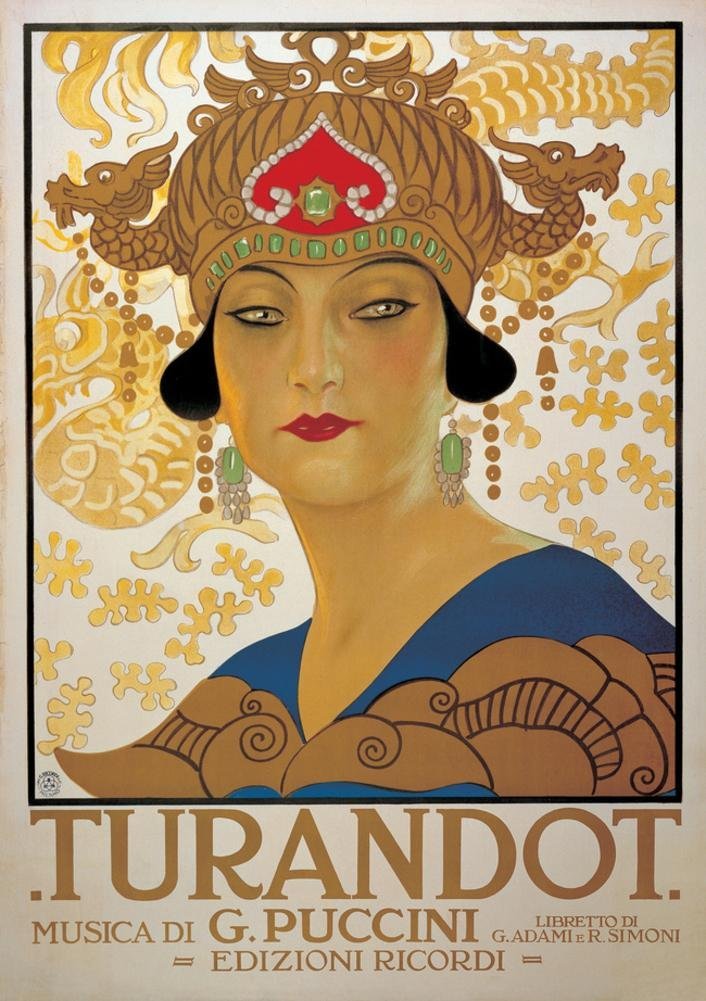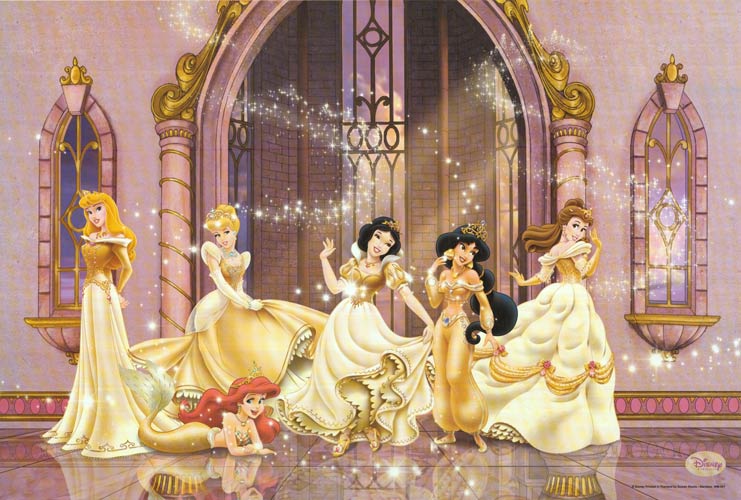Libretto of Turnadot tells the story of a mysterious prince and his determination to be with the one that he loves, Princess Turnadot. The conflict of the opera exists in the coldness and cruelty affiliated with Turnadot. Due to her female ancestors poor experience with patriarchy, Princess Turnadot established an oath where if a prince were to marry the princess, he must take upon the challenge of solving three impossibly difficult  enigmas, and if he is to fail then he will be executed. The mysterious prince decides to make an attempt at marrying Turnadot, despite warnings from those around him, and succeeds in solving the enigmas. The opera concludes with the two of them happily falling in love with each other. However, this does not happen quite so easily.
enigmas, and if he is to fail then he will be executed. The mysterious prince decides to make an attempt at marrying Turnadot, despite warnings from those around him, and succeeds in solving the enigmas. The opera concludes with the two of them happily falling in love with each other. However, this does not happen quite so easily.
What I struck me the most about the opera was that the perspective on “love” was quite unclear until the end of the play. When the prince first sees Turnadot, he is infatuated by her presence and is convinced that he must risk his life in order to marry her, and that if he could not do so his life would be meaningless. This emotion is conveyed rather negatively throughout Act 1. His father begs him not to take the challenge, fearing that that he will simply lose his life because of it, and the ministers of the emperor are assured that he will never win the love that he desires. His passion is portrayed as foolish and blinded, reducing him into a naive boy succumbed to the beauty of Turnadot. This negative attitude towards “love” continues when Turnadot appears, and explains how her greatest desire is to live freely without the limitations that coincide with of marriage to a man. She gravely explains how her beloved ancestor was prisoned into her marriage, and expresses her determination to remain independent and free. In this way, the opera portrays love and something binding and limiting. In spite of this, the opera’s portrayal of love changes as the story evolves.
After the prince solves the three enigmas, Turnadot is outraged and refuses to go with him willingly, to which the prince responds by offering her a deal. He gives her the challenge of discovering his name, and if she is able to do so by dawn, she may have his head. Turnadot agrees to the challenge, and stirs the Imperial City, proclaiming that no one should rest and if the name is not discovered, everyone shall be tortured and killed. Shortly after it is dicovered that the only person that knows the prince’s name is a servant of his family, Liù; however, she refuses to reveal his name because she herself loves the prince, and knowing his passionate desire to be with Turnadot, does not want to take that chance away from him. Turnadot is enraged by this and orders for her to be tortured until she exposes the name. This results in Liù killing herself in order to protect the prince’s identity. Liù’s love is portrayed as innocent and pure, and the crowd mourns for her death as a result. Turnadot herself is shocked by the genuine nature of Liù’s love. In this way, the opera demonstrates love in the form of courageousness and selflessness, a quality that instills a sense of admiration within the audience. This positive portrayal of love is continued with the prince kisses Turnadot, melting her icy heart and bringing joy to both Turnadot and himself. This change of events results in Turnadot accepting his love, and willingly going with him as his lover, concluding the play. This conclusion is portrayed in a celebratory way, and demonstrates love as a source of pure joy, something that should not be stripped away from the heart. This evolution of love was what I found most interesting about the opera.
with him willingly, to which the prince responds by offering her a deal. He gives her the challenge of discovering his name, and if she is able to do so by dawn, she may have his head. Turnadot agrees to the challenge, and stirs the Imperial City, proclaiming that no one should rest and if the name is not discovered, everyone shall be tortured and killed. Shortly after it is dicovered that the only person that knows the prince’s name is a servant of his family, Liù; however, she refuses to reveal his name because she herself loves the prince, and knowing his passionate desire to be with Turnadot, does not want to take that chance away from him. Turnadot is enraged by this and orders for her to be tortured until she exposes the name. This results in Liù killing herself in order to protect the prince’s identity. Liù’s love is portrayed as innocent and pure, and the crowd mourns for her death as a result. Turnadot herself is shocked by the genuine nature of Liù’s love. In this way, the opera demonstrates love in the form of courageousness and selflessness, a quality that instills a sense of admiration within the audience. This positive portrayal of love is continued with the prince kisses Turnadot, melting her icy heart and bringing joy to both Turnadot and himself. This change of events results in Turnadot accepting his love, and willingly going with him as his lover, concluding the play. This conclusion is portrayed in a celebratory way, and demonstrates love as a source of pure joy, something that should not be stripped away from the heart. This evolution of love was what I found most interesting about the opera.
After reading the play, I became pensive about the idea that love takes many forms. Sometimes it can be foolish, even dangerous, whilst also being motivation for courageousness and a source of joy. All of the emotions that Libretto of Turnadot conveyed through the simple concept of love was diverse and plentiful, which I found quite interesting, considering that the subject itself is singular. The morphing of love throughout the plot is what left me the most intrigued whilst experiencing
the opera, and ultimately, I really enjoyed it.



 Imagine that you see the girl of your dreams for the first time. Staring across the moonlit sky, your eyes meet and it’s love at first sight. As your gazes cross, you instantly feel that spark. While this romance might sound like a typical Romeo and Juliet love story, its true nature is much more twisted than that. That one special moment in time where you held each other’s gaze mesmerizes you and you become a prisoner to her charm. The only way to free yourself is through her love.
Imagine that you see the girl of your dreams for the first time. Staring across the moonlit sky, your eyes meet and it’s love at first sight. As your gazes cross, you instantly feel that spark. While this romance might sound like a typical Romeo and Juliet love story, its true nature is much more twisted than that. That one special moment in time where you held each other’s gaze mesmerizes you and you become a prisoner to her charm. The only way to free yourself is through her love.
 As expected, the prince answered the unanswerable and baffled Turandot, but plot twist the Princess begs to void the marriage. Calaf then challenged her to a question of his won, if she found out his name before dawn, he would live no more. This leads to a series of events where the prince’s slave commits suicide in an attempt to save his identity from being discover. This Is a major area in the play where the theme of love could be seen. The slaves love for the prince was so strong that she was willing to give her life from him to be able to live with another woman. I just have no words for that, its appalling.
As expected, the prince answered the unanswerable and baffled Turandot, but plot twist the Princess begs to void the marriage. Calaf then challenged her to a question of his won, if she found out his name before dawn, he would live no more. This leads to a series of events where the prince’s slave commits suicide in an attempt to save his identity from being discover. This Is a major area in the play where the theme of love could be seen. The slaves love for the prince was so strong that she was willing to give her life from him to be able to live with another woman. I just have no words for that, its appalling. and the emotions. The way Birgit Nilsson’s voice resonated in my head was beautiful. You could almost feel what she’s feeling and be one with her. I believe that actually hearing music and signing while watching the play will give us a completely different aura.
and the emotions. The way Birgit Nilsson’s voice resonated in my head was beautiful. You could almost feel what she’s feeling and be one with her. I believe that actually hearing music and signing while watching the play will give us a completely different aura.





 What was so interesting about reading this Opera was to see how the idea of Love isn’t glorified with positive connotations as it may be in other stories. In this Opera, Love is
What was so interesting about reading this Opera was to see how the idea of Love isn’t glorified with positive connotations as it may be in other stories. In this Opera, Love is

 enigmas, and if he is to fail then he will be executed. The mysterious prince decides to make an attempt at marrying Turnadot, despite warnings from those around him, and succeeds in solving the enigmas. The opera concludes with the two of them happily falling in love with each other. However, this does not happen quite so easily.
enigmas, and if he is to fail then he will be executed. The mysterious prince decides to make an attempt at marrying Turnadot, despite warnings from those around him, and succeeds in solving the enigmas. The opera concludes with the two of them happily falling in love with each other. However, this does not happen quite so easily.




Recent Comments